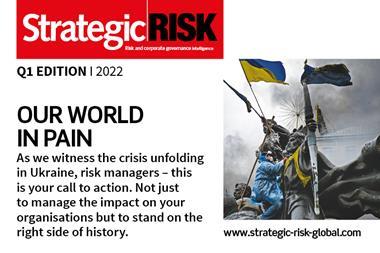Julia Graham says people risks are at the centre of Airmic members’ current concerns
Two years on from the global pandemic, the invasion by Russia of Ukraine is another example of how risk forecasts underestimated the scale of an impending crisis. This is according to Airmic chief executive Julia Graham.
“There is an urgent need for all of us to up our game in identifying and preparing for emerging risks, and to think more deeply about the kinds of systemic risks which will unfortunately be a feature of the world we live in today,” she said.
Graham says the risk association’s members are exposed to a wide range of impacts emanating from the Ukraine crisis, but that people risks are the forefront of their concerns.
Speaking to StrategicRISK, she said a wide range of industry sectors were feeling the effects, which range from sanctions and financial risks to supply chain disruption and energy supply issues.
Fast-evolving crisis
But it is the safety and wellbeing of people affected that is front and centre of mind, especially for businesses with operations in Ukraine, Russia or in neighbouring countries.
“Airmic is taking a joined-up approach in guiding our members through this generation-defining crisis, as a reflection of the interconnected risks this conflict has brought,” said Graham.
“We are maintaining a resource page on our website relating to the crisis, which seeks, with the support of our partners and other business connections, to provide a risk radar for our members and the wider risk community.
“We are also running regular meetings of our Geopolitics Special Interest Group in tandem, which have seen record numbers of attendees as well as a planned insurance-focused roundtable.
”All of this provides the platform for risk professionals to share their experiences and exchange ideas during a fast-evolving crisis with far-reaching implications.”
World of shocks
The conflict unfolding in Ukraine once again is a reminder of the increasingly unpredictable and complex risk landscape businesses are operating in.
”The volatility in international relations we are seeing today is a confluence of several explosive factors, which was long in the making,” said Graham. “It has its roots in the austerity faced by many societies in the aftermath of the global financial crisis of 2008-9.
“Adding to the potent mix since, we have seen the rising impact of social media, increasing geopolitical tensions, the pandemic, and pressure on energy resources.”
“The world may get even more unpredictable and tumultuous from here, and this is where risk professionals have a role to play in stepping up to help their organisations navigate and respond through it all.”
Faced with another global shock in a world still emerging from the pandemic crisis, Graham says the onus is once again on the risk management community.
”There is an imperative for risk professionals to learn and apply the lessons of the pandemic and the Ukraine crisis, boost preparedness, so as to ensure the agility and adaptability of their responses during a fast-moving crisis. Skills associated with scenario planning will be at the forefront.”




















No comments yet